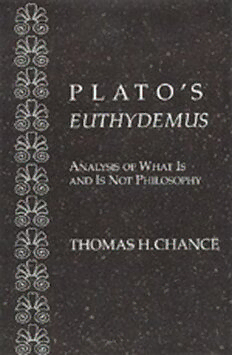
Plato's Euthydemus: Analysis of What Is and Is Not Philosophy PDF
139 Pages·1992·2.118 MB·English
Most books are stored in the elastic cloud where traffic is expensive. For this reason, we have a limit on daily download.
Preview Plato's Euthydemus: Analysis of What Is and Is Not Philosophy
Description:
With Plato's Euthydemus, Thomas Chance solves a longstanding riddle of Platonic studies. Thought to be an early, immature work, the Euthydemus has come across to scholars as lacking Plato's characteristic greatness. This apparent lack, Chance argues, is not a failure of the text but of scholarly perception. He advances a single thesis: that Plato deliberately presents eristiccontentious debateas the antithesis to his own philosophical method. Once this thesis is accepted, the "hidden" purpose of the Euthydemus becomes manifest: Plato has used the occasion of his dialogue to combine a brilliantly crafted parody of sophistic antilogy with a subtle yet forceful exhortation designed to persuade all of us to pursue virtue and to love wisdom.
See more
The list of books you might like
Most books are stored in the elastic cloud where traffic is expensive. For this reason, we have a limit on daily download.
